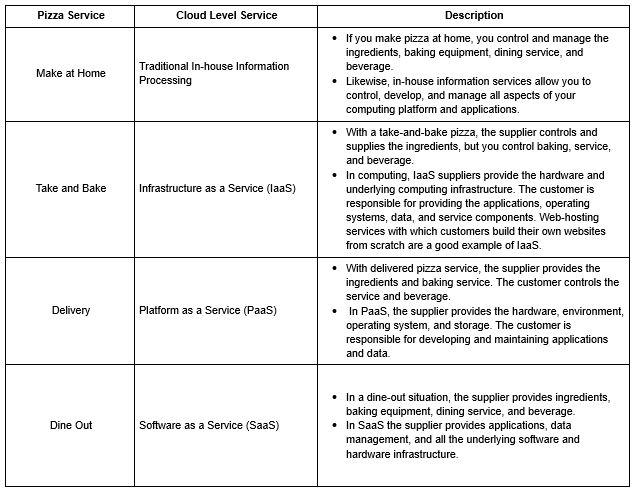President
- FMA
- The Fabricator
- FABTECH
- Canadian Metalworking
Categories
- Additive Manufacturing
- Aluminum Welding
- Arc Welding
- Assembly and Joining
- Automation and Robotics
- Bending and Forming
- Consumables
- Cutting and Weld Prep
- Electric Vehicles
- En Español
- Finishing
- Hydroforming
- Laser Cutting
- Laser Welding
- Machining
- Manufacturing Software
- Materials Handling
- Metals/Materials
- Oxyfuel Cutting
- Plasma Cutting
- Power Tools
- Punching and Other Holemaking
- Roll Forming
- Safety
- Sawing
- Shearing
- Shop Management
- Testing and Measuring
- Tube and Pipe Fabrication
- Tube and Pipe Production
- Waterjet Cutting
Industry Directory
Webcasts
Podcasts
FAB 40
Advertise
Subscribe
Account Login
Search
How fabricators can be savvy consumers of cloud computing services
Understanding SaaS, IaaS, PaaS and agreements that come with these IoT-driven services
- By Bill Frahm
- Updated June 25, 2019
- June 25, 2019
- Article
- Shop Management

If a fabrication company includes cloud computing resources in its IoT implementation, there are many opportunities and risks to consider.
Cloud computing is mentioned frequently as a component of the internet of things (IoT). So what is it?
Basically, cloud computing is a service that allows customers to use computing resources hosted and maintained by others. The concept dates back to the time-sharing arrangements from the 1960s, in which large data centers rented excess capacity to customers.
Categories of Cloud Computing Services
Since cloud computing is a somewhat ambiguous term, let’s define it as three categories of computing services:
- Software as a service (SaaS)
- Infrastructure as a service (IaaS)
- Platform as a service (PaaS)
One of the easiest-to-understand explanations of these categories comes from Albert Barron of IBM. His analogy is simply to ask, “How would you like to get your pizza?” Summarizing his analogy, we can look at pizza acquisition in four categories: make it at home, take it home and bake it, order it delivered to your door, and eat out (see Figure 1).
If you’re considering implementing the IoT, there is a good chance that cloud computing will be included in your infrastructure. Perhaps some of your enterprise applications are already hosted by cloud services. Big data can be challenging to maintain, so hosted data services may be a part of your IoT system.
Cloud services offer several benefits over homegrown solutions, including:
- Somebody else is responsible for upgrades and updates.
- You won’t need to support the hardware and operating infrastructure.
- Your host should provide backup and failover services.
- The services should be reliable and significantly tested and reviewed by other users.
Before You Buy into a Cloud Service
Despite the inherent convenience of cloud service, there are numerous issues you should resolve with your cloud service supplier before entering an agreement. You must know that your cloud supplier’s product will work with your infrastructure and meet your business requirements.
Enter the agreement with your eyes wide open and be sure to consider the following:
- Technology and service growth—You should understand the technologies your supplier employs and how they will integrate with your existing infrastructure. Your supplier should also share its road map for innovation and support of the most currently available technologies.
- Information management and security—You should already have your information classified to protect sensitive proprietary, corporate, and personal data. Your management is responsible for supporting both corporate policy and government requirements. When selecting a cloud supplier, you must review its information security policies and technologies to ensure that they can support your security requirements.
- Contract and service level agreements—Cloud service agreements are not yet standardized. They are often written with jargon that can be confusing. Service agreements should include requirements for service delivery, data management and assurance, business protections, and legal protections. If you need help in developing a service contract, take a look at ISO/IEC 19086-1:2016.
- Performance, reliability, and disaster recovery—Check your supplier’s history in meeting the requirements of its service agreements. The supplier should have the statistics available to share with you. Also review its processes and plans to recover from disasters and to preserve the integrity of your data.
- Migration support and exit strategies—If your supplier uses proprietary technologies, it is possible you can be locked into your relationship. You should be wary of dependence on proprietary technologies, should you want to move to another supplier. You should also define migration and exit strategies should you choose to change your cloud supplier.
- Supplier and subcontractor business health—Equally as important as technical capability, you want to trust your information to a supplier that has a successful business history. The financial health of your cloud supplier and its subcontractors is a vitally important concern for you in ensuring continuity of your information operations.
This is a very high-level and far-from-comprehensive summary of the many complexities of cloud computing. If you include cloud resources in your IoT implementation, there are many opportunities and risks to be considered.
The cloud is an excellent way to include enterprise quality components. As with any technology implementation, you must do your research to incorporate the right supplier and mix of resources.
About the Author

Bill Frahm
P.O. Box 71191
Rochester Hills, MI 48307
248-506-5873
subscribe now

The Fabricator is North America's leading magazine for the metal forming and fabricating industry. The magazine delivers the news, technical articles, and case histories that enable fabricators to do their jobs more efficiently. The Fabricator has served the industry since 1970.
start your free subscription- Stay connected from anywhere

Easily access valuable industry resources now with full access to the digital edition of The Fabricator.

Easily access valuable industry resources now with full access to the digital edition of The Welder.

Easily access valuable industry resources now with full access to the digital edition of The Tube and Pipe Journal.
- Podcasting
- Podcast:
- The Fabricator Podcast
- Published:
- 04/16/2024
- Running Time:
- 63:29
In this episode of The Fabricator Podcast, Caleb Chamberlain, co-founder and CEO of OSH Cut, discusses his company’s...
- Trending Articles
AI, machine learning, and the future of metal fabrication

Employee ownership: The best way to ensure engagement

Dynamic Metal blossoms with each passing year

Steel industry reacts to Nucor’s new weekly published HRC price

Metal fabrication management: A guide for new supervisors

- Industry Events
16th Annual Safety Conference
- April 30 - May 1, 2024
- Elgin,
Pipe and Tube Conference
- May 21 - 22, 2024
- Omaha, NE
World-Class Roll Forming Workshop
- June 5 - 6, 2024
- Louisville, KY
Advanced Laser Application Workshop
- June 25 - 27, 2024
- Novi, MI



























